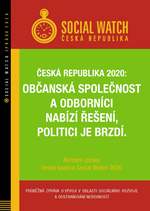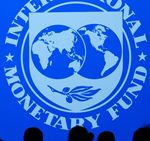Social Watch news
Published on Tue, 2020-11-03 19:32
Following the opening of the 75th Session of the UN General Assembly (UNGA) and a series of High-level meetings and events parallel to the General Debate, the UNGA plenary and committees have shifted to a pattern wherein the Member States debate and negotiate resolutions on a range of topics. Across the UNGA agenda, priorities include COVID-19 recovery, the UN Decade of Action--the final 10 years to achieve the Sustainable Development Goals (SDGs) ---and the call for necessary reforms for the UN to be effective across management, peace and security and development. Reform to the UN Development System (UNDS) will be a prime agenda item of the UNGA Economic and Finance (Second) Committee negotiations, with an outcome resolution of its Quadrennial Comprehensive Policy Review (QCPR) expected in November or December. |
Published on Tue, 2020-11-03 00:00
Social Watch Czech Republic releases an annual report evaluating the progress of the Czech Republic towards reaching the UN Sustainable Development Goals. The report is divided into five sections: people, planet, prosperity, peace, and partnership. The Czech Republic is failing to meet many of the UN sustainable development targets, with progress only visible in certain areas, according to a report last week from Social Watch CZ, a non-governmental organization that monitors compliance with the goals. |
Published on Mon, 2020-11-02 15:43
The presentation by Finland of its second VNR in 2020 initiated a new kind of cooperation between state authorities and civil society, with non-governmental actors presenting their assessment in the official report. Both views are largely in line, but civil society is more critical. There is no extreme poverty in Finland and a comprehensive social security covers the whole population. Still there are challenges in relation to poverty and inequality. A crucial problem is that increasing in inequalities and social exclusion seem to accumulate and extend across generations, causing intergenerational transmission of poverty. |
Published on Mon, 2020-11-02 15:27
As a result of longstanding failures in dealing with internal and external challenges, and in particular conditionalities imposed by IMF loans, Jordan has faced a large series of social and political protests in recent years. In the wake of increasing deteriorations of the economic situation, the demonstrations have received an enormous upswing and received public support from all segments of society. The alternative report on Jordan, prepared by the Phenix Center for Economic Studies, describes the dynamics and the leading role of Civil Society Organizations (CSOs) during the demonstrations, and takes a look at the aftermath of the protests and upcoming challenges. |
|
Published on Mon, 2020-11-02 15:06
Feminist organizations have insisted for decades on the importance of recognizing the systemic role of care work. This invisible work is indispensable for reproducing the labour force and more broadly for sustaining life. The COVID-19 pandemic has transformed this feminist message into an accepted truth. The new coronavirus has forcefully exposed the fragility of human life. All of us face the risk of catching a disease that can kill us. In this context, it is also made very visible that our lives are interdependent. To avoid contagion, we need to take care of ourselves, but we also depend on the whole of society adopting habits of caring. |
Published on Fri, 2020-10-16 11:55
Only a handful of political leaders decided to confront scientific advice, and one of these was President Jair Bolsonaro of Brazil, for whom COVID-19 was “just another little flu”. The result has been catastrophic, not just in terms of the pandemic (over 100,000 diagnosed deaths by mid-August 2020, second only to those in the USA) but also in terms of the economy that his denial policies tried to protect. In June, the World Bank forecast an 8 percent decline in Brazil’s GDP in 2020 (from a previous forecast of 2% growth), while the global economy is estimated to decline by 4.9 percent and emerging market and developing economies, including Brazil, by 3 percent, in their first contraction in at least 60 years. |
Published on Fri, 2020-10-16 11:50
A range of different forms of confinement and quarantine were implemented around the world in order to slow down the spread of the pandemic and avoid a collapse of overburdened health systems. In that process, low-paid services such as home deliveries, food processing, garbage collection and care-giving were identified as “essential”. In most comparatively affluent countries those services are largely provided by immigrants and yet, as reported from the UK by Imogen Richmond-Bishop of Just Fair, “COVID-19 has disproportionately affected migrant communities” through drops in income; limited access to welfare support; barriers for homeless migrants to access accommodation and overcrowded and substandard housing.” |
|
Published on Fri, 2020-10-16 11:38
Governments and international organizations have responded to the economic and health crises resulting from the COVID-19 pandemic and consequent lockdown on an unprecedented scale. The announced liquidity measures, rescue packages and recovery programmes total US$ 11 trillion worldwide. A total of 196 countries and territories have taken political measures, albeit of very different scale and scope, depending on their fiscal capacity and policy space. If used in the right way, these programmes could offer the chance to become engines of the urgently needed socio-ecological transformation proclaimed in the 2030 Agenda for Sustainable Development. Some governments and international organizations have explicitly articulated this claim by promising not to return to the old normal after the dual crisis and to "build back better", for instance by a Green (New) Deal. |
Published on Sat, 2020-10-10 00:00
Join the Conference and empower BDCSOprocess virtual annual conference 2020 In Zoom with Bangla and English translation facilities. Non-member, please register in this link, you will receive the software link later. Session 10th Oct. Dhaka time 11h30: UN in 75, Interfacing Government and Civil Societies for Development and Sustainable Peace |
Published on Tue, 2020-10-06 00:00
More than 500 organisations and academics from 87 countries have issued a statement today calling on the International Monetary Fund (IMF) to stop promoting austerity and instead support policies that advance gender justice, reduce inequality, and put people and planet first. The IMF has already begun locking some countries into long term austerity-conditioned loans, while encouraging countries to take such recovery measures through its short-term, front loaded emergency financing packages. Such policies will further entrench gender and economic inequality and undermine any chance of an inclusive recovery, especially as many countries in the Global South are expected to need more long-term financing in the near future. |
SUSCRIBE TO OUR NEWSLETTER










